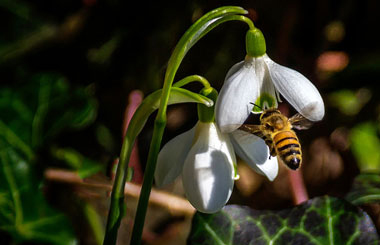Local news from Milford, Hamburg and Ann Arbor covered in this issue of News to Us. The debate on safe levels of PFAS in drinking water continues and the EU takes action to further limit the use of the insecticides linked to dramatic honeybee declines worldwide.

Why People in this Michigan Suburb Say General Motors Polluted Their Water Supply Residents of The Oaks neighborhood in Milford have been using bottled water for most household purposes for more than a decade because of high salt and arsenic levels in their groundwater drinking water. The source of this contamination is thought to be the nearby GM Proving Grounds.
Huron River flood stage expected to reach 7.6 feet this week in Hamburg Township High water throughout the watershed is resulting in some localized flooding. Recent rains have the Huron River reaching near record flow rates in some places including Hamburg. While flood conditions are normal for this time of year, use caution when using the river. High water can result in swiftly moving water and can be dangerous.
DTE unveils plan for $75M riverfront redevelopment in Ann Arbor An agreement between landowner DTE Energy and development company Roxbury Group brings us one step closer to being able to dine al fresco on the Huron River as it runs through Ann Arbor. While there is still much planning to do this is one of HRWC’s top properties for clean-up and redevelopment along the riverfront. We have been anticipating this news since we started RiverUp! in 2012, the public + private partnership to revitalize the Huron River for its communities. Read more about it at HRWC’s blog.
EPA’s ‘safe’ PFAS level is 6 times too high, blocked report says Debate continues at the federal level as to what constitutes safe levels of per- and polyfluoroalkyl substances or PFAS. This is relevant to Michiganders as several drinking water sources in the state have been found to contain high levels of these substances.
EU agrees total ban on bee-harming pesticides In response to dramatic, worldwide declines in honeybees, the European Union has decided to ban the use of neonicotinoids—a class of pesticides that have been linked to these declines. As garden season is upon us, please select neonicotinoid free plant material where possible. New efforts to label plants grown without the use of these insecticides are making this easier.



